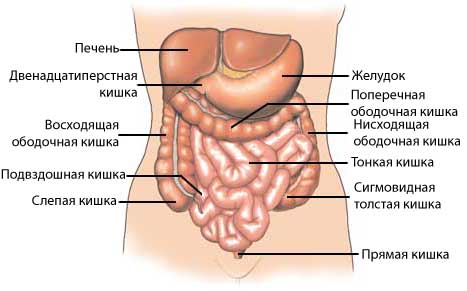Neurogenic intestine
Description of neurogenic bowel
Neurogenic intestine – disorder, consisting in the chair and retention problems defecation due to nerve damage.

Causes of neurogenic bowel
The process of digestion partly controlled by signals between the brain and the digestive system. These signals are sent through the nerves. When the nerves are damaged, communication between the brain and the digestive system is blocked. This prevents normal bowel habits.
The spinal cord runs from the base of the brain to the lower back. There are two main types of neurogenic bowel, whichever, where along the spinal cord nerve damage.
Reflection intestine
There, when there is damage to the nerve in the neck or chest. Communication between the colon and the brain is interrupted. As a result,, a person can not feel the urge to defecate. But, chair still accumulates in the rectum, which leads to involuntary defecation.
Arefleksiya intestine
There, when it damaged the lower end of the spinal cord. When damaged by lower nerves, a person is unable to feel the need to defecate. Besides, increased muscle tone, therefore oprozhnenie rectum may be delayed, that can lead to constipation.
Risk factors for neurogenic bowel
The main risk factor is a spinal cord injury.
Symptoms of neurogenic bowel
These symptoms, except for neurogenic bowel, They may be caused by other disorders. Tell your doctor, if you have any of the following symptoms:
- The problem with feces;
- Repeated cases of bowel incontinence;
- Razdutыy life;
- Feeling of fullness in the abdomen;
- Liquid or very hard stools;
- Bleeding from the rectum;
- Abdominal pain.
Diagnosis of neurogenic bowel
Doctor:
- Ask about your symptoms and medical history;
- A physical exam.
Tests may include:
- Rectal examination;
- Tests for blood in the stool.
Treatment of neurogenic bowel
Treatment may include:
Methodology for the normalization of the bowel
The methodology is designed to provide the following:
- Ensure effective way stool;
- Prevent involuntary defecation;
- Create a predictable schedule bowel movements.
The program may include:
- Following a specific diet and physical activity;
- Medication to normalize bowel function;
- Performing finger stimulation, to induce defecation;
- Work with doctors, to find the perfect time to visit the toilet and position during defecation;
- Using other methods to accelerate defecation (eg, ups, abdominal massage, deep breathing, the use of a warm liquid).
Medicines
The main types of drugs for the treatment of neurogenic bowel include:
- Plasticizers chair – allow to soften the stool, making it easier defecation;
- Stimulants intestine – stimulate the colon to move quickly through the digestive tract cal;
- Osmotic laxatives – intestine fills with water, to increase stool volume;
- Formulations for increasing stool.
Types of drugs, that you will take, depend on certain factors, such as the type of neurogenic bowel, taken medication and diet.
Finger Stimulation
Finger stimulation carried out, to induce bowel movements by stimulating the rectum. In carrying out this procedure, the doctor inserts a lubricated gloved finger into the rectum. He will slowly move your finger in a circle. Other incentives include:
- Candles – stimulating nerves in the lining of the rectum;
- Enema – stimulate the nerves and soften the stool.
Operation
Sometimes surgery may be needed, such as:
- Colostomy – colon from the body surface outputted to remove solid waste.
- Ileostomy – output is performed on the surface of the body of the small intestine.
Prevention of neurogenic bowel
This disorder can be prevented. You can reduce the risk of spinal cord injuries by taking certain precautions:
- Use seat belts in the car;
- Avoid actions, which can harm the spine.
